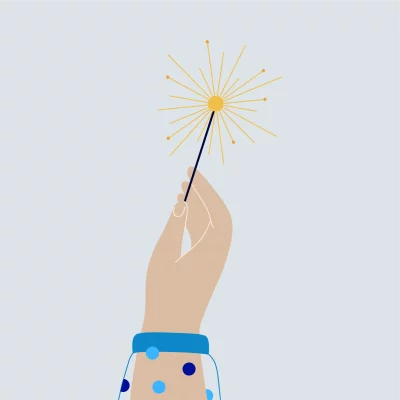The start of a new year often marks the time for self-reflection and goal-setting. It’s as if you have been given a clean slate to start anew, with renewed hope and determination for your goals. This is especially true regarding New Year’s resolutions – the promises you make to yourself to improve your life over one year.
While many people focus on physical health and fitness, prioritizing your mental health is the best way to improve all areas of your life. This is where “Mental Health Resolutions” come into play – resolutions geared explicitly towards improving mental health symptoms that may hold you back in multiple areas of life.
This article will discuss some critical mental health resolutions you can incorporate into your daily routine in 2024. These habits and practices may seem simple, yet they can profoundly impact your mental health if you commit to them consistently. Adding some or all of these mental health resolutions to your 2024 resolution list may result in lasting changes for you this year.
1. Develop Self-Awareness
Self-awareness is the ability to recognize and understand your emotions, thoughts, and behaviors, internally and externally. It allows you to identify triggers and patterns that may be negatively affecting your mental health.
Here are some ways to cultivate self-awareness:
- Practice mindfulness: Mindfulness involves staying present in the moment and being aware of your thoughts and feelings without judgment. This can help you understand your reactions to different situations better.
- Keep a journal: Writing down your thoughts and emotions can provide valuable insights into your mental state. It also serves as a safe outlet to express yourself without any inhibitions.
- Seek feedback: Ask friends and family for honest feedback on how you come across to them. This can give you a different perspective on your behavior and help identify areas of improvement.
In addition to identifying your feelings, self-awareness can improve your relationships and even lead to more successful counseling sessions.
2. Let Go of Perfectionism
Perfectionism seems like a worthwhile goal. It can show you have a value for greatness or doing things well. In reality, perfectionism can be a sign that you may have once felt dismissed, invalidated, or not good enough. You may believe (consciously or subconsciously) that the effort you put in to do things perfectly will make you feel better once you complete your task. It almost always causes more stress, anxiety, and intense thoughts of feeling incompetent.
Perfectionism often leads to negative or unhelpful thought cycles that halt productivity and progress. One of those thought cycles is called Analysis Paralysis.
Why Analysis Paralysis Makes You Painfully Indecisive
When your goal is to do “the right thing,” it can lead you to constantly search for more information, thinking there is still more out there you need before knowing the right decision.
It results in endless book highlighting, excessive browser tabs, and too many Google searches to count, which can leave you with more questions than answers.
Also, analysis paralysis can lead to high levels of stress and anxiety. With deadlines being pushed back or missed because you are trying to find more information, it can make you feel ineffective and always scrambling at the last minute to get things done.
You may find it difficult to stop this negative thought pattern, so here are some ideas to change your thinking.
What to know to dismantle perfectionism:
1. There is more than one correct answer for any given issue.
The stress associated with the pursuit of perfection is based on one correct answer, and if you can reach the right answer, you have done something well, and your personal value goes up. It is essential to realize there is no one correct answer to most situations.
The truth is that there are often multiple roads, avenues, and answers to any problem you face. Accepting that numerous answers or solutions are available and you have the judgment to make a wise decision can help you stop getting caught in analysis paralysis.
The goal with this thought is to know when to stop searching for more information, trust yourself, and be decisive with confidence.
Also, finding a “perfect” answer to a problem does not increase your value. Your value is always inherent and never-ending.
2. MVP: Minimal Viable Product.
Instead of striving for perfection, focus on the minimal viable product – the functional and satisfactory solution. This can help reduce unnecessary stress and pressure on yourself.
For example, imagine you are planning an event. Instead of trying to make everything perfect and stressing over minor details, focus on the essential elements to make the event successful. This mindset can be applied to various aspects of life, from work projects to personal goals.
3. Action Over Daydreaming
If you experience anxiety or depression, you may have your head stuck in the clouds for a lot of the day. If you lack the energy to complete an extensive to-do list, it’s easier to let ideas run wild in your mind instead.
For instance, perhaps you struggle with frequent bouts of depression. Because of this, you may find it hard to tidy up your space, do your laundry, shower, or study for a test. With this lack of energy, it’s easier to daydream about what your ideal job would look and feel like.
You imagine your desk, your coworkers, what you would wear, your work, and how important and accomplished you feel. Before you know it, it’s been 2 hours of living in the fantasy of who you want to be.
Initially, this fantasy can feel rewarding and help you experience feelings of happiness and success. The result is actually building a fantasy that isn’t true to your current self and awakening to your current state where nothing has changed. This result can feel overwhelming and may start an episode of depression or anxiety.
Instead, focus on taking action.
You may ask, “How can I focus on action if I can barely get out of bed?”
Great question. The answer is the 1% rule. Atomic Habits author James Clear wrote about the importance of changing just 1% each day to see exponential change over a year.
No matter what action you take, it will help result in change over time. Today can be the day you get out of bed, make your bed, and relax on the couch instead of staying in bed all day. Maybe it’s brushing your teeth or showering. If you have enough energy, you could utilize stress-reducing techniques at work to feel more energized when you get home.
The days of waking up and changing every area of your life only to feel overwhelmed by day 3 are over. Just choose one action today and feel proud of your effort.
Note: There is power in positive visualization, in which you are picturing yourself in a different space or completing something you are working towards. There is sports psychology that states the practice of positive visualization ( also known as Sports Imagery Training) is crucial to the success of athletes’ performances. Positive visualization is different than living in a daydream. The intention behind them is different and, therefore, can dictate which one you are participating in.
Suppose you are working towards a goal, and the visualization helps motivate you to keep working on the goal. In that case, you are most likely using positive visualization. If you visualize a different version of yourself to escape your current reality and have no intention of taking action toward those goals, you are most likely stuck in a daydream.
4. Habits Create Change
Once you get one action down a day, it’s time to think about your habits and what results those actions are moving you toward. Make a list of the changes you want to see in your life. From that list, write a list of daily actions you think people who have reached those goals do.
Let’s say your goal is to feel more peaceful. Some examples of actions those who feel peaceful do daily are practicing gratitude, using affirmations, meditation, reducing stress through self-care, and creating more positive self-talk. Look through your list of habits and determine which ones you want to practice, which ones you are uninterested in, and which is a good one to start with.
If you are still determining what habits might lead to your goal, Google is your friend. A quick search can give you great suggestions on how to act to move toward that growth area.
To make lasting change, take things slow. Choose one habit at a time, give it a week or two, and see how you feel. After you’ve practiced your new habit for at least 7 days, ask yourself:
- Do you like this habit?
- Do you do this action automatically without thinking about it? (aka, is it a part of your routine now?)
- Can you add another habit now, or do you want to keep focusing on the current habit?
Habits are best practiced for at least 21 to 30 days. Some habits are easier than others to get used to and add to your routine. Others may take a longer time getting used to. Pace yourself in a way that feels comfortable and sustainable.
Once you feel confident with this habit, try adding another one from either the same goal or another. You can create lasting change and progress toward your goals with consistent action and staying in the present moment.
5. Learn Positive Self-Talk
Have you heard the saying, “You are your own best friend.”? Now, think about the things you have said to yourself throughout today.
- Were they supportive and uplifting?
- Negative or hurtful?
- Would you speak to your friend or loved one the same way you talk to yourself?
You may not notice how you speak to yourself or be fully aware that you are quick to say negative or mean things to yourself. When you are in a negative mind space, changing it to a more positive one can be challenging.
Here are some examples of negative self-talk and a positive self-talk alternative:
Negative Self-Talk Positive Self-Talk
I will never understand this. I will figure it out one step at a time.
I won’t be able to get that job. I can grow my skills so I am prepared for the job I want.
I always screw things up. Making mistakes is normal. I will learn from them when I do.
From these examples, you can see how the shift in self-talk can improve how you look at situations so that you can grow and succeed. What leads you to success is that you believe success is possible. With that belief, the sky’s the limit.
6. Understand Progress Takes Time
As much as Facebook, Instagram, or TikTok content would like you to believe, progress and results do not happen overnight. There is no quick fix for mental health symptoms.
What progress looks like is baby steps: Small, sustainable steps or habits that result in progress and significant change over time. This is echoed in the 1% rule mentioned earlier.
Celebrate small victories and the most minor of progress. Build a system of habits that promote progress and achievement with consistency. Most importantly, be patient with yourself as you control your life. Getting out of bed takes courage, strength, and resilience when you find it difficult. Each and every step you take is worth celebrating.
7. Make Counseling a Priority
Counseling is an integral part of mental health resolutions. It involves talking to a trained professional about your thoughts and feelings in a safe and confidential setting.
Here’s why counseling with Makin Wellness works:
- Provides an outside perspective: Our counselor can offer a different viewpoint on your situation, helping you gain clarity and make better decisions.
- Offers validation and support: Opening up about your struggles can feel intimidating, rest assured that our counselors are non-judgmental and empathetic. They can provide validation and support, which can be immensely reassuring.
- Teaches coping skills: Our counselors will equip you with tools and techniques to manage stress, anxiety, and other mental health symptoms effectively. These skills can also help you navigate challenging times in the future.
The Benefits of Online Therapy with Makin Wellness
In recent years, online therapy has gained popularity as a convenient and effective way to access counseling. It involves virtual sessions with a licensed therapist through video or phone calls, emails, or text messages.
Here are some benefits of online therapy:
- Accessibility: With online therapy, you can receive support from the comfort of your home at a time that works for you. This is especially helpful for those living in remote areas or with limited mobility.
- Anonymity: For some, the stigma surrounding mental health can be a barrier to seeking therapy. Online counseling allows you to maintain anonymity and seek help without fearing judgment.
- Comfort and Familiarity. You can participate in therapy sessions from the comfort and privacy of your own home, which can contribute to a sense of security and openness.
Whether you need flexibility, accessibility, or want to ensure your therapy gives you feelings of comfort and familiarity, online mental health therapy with Makin Wellness can be a great option for your busy lifestyle and mental health resolutions.
Conclusion: Mental Health Resolutions for 2024
Incorporating mental health resolutions can have a significant impact on improving your mental health symptoms. Prioritizing effort toward your self-awareness, thoughts, actions, and self-talk can help you reduce stress, take control of what may be holding you back from the life you want, and empower you to take the action necessary to make your dreams come true.
Remember that progress will come with baby steps that add up to significant change over time. Have patience with yourself. Goals can take time to reach, especially mental health goals that may have deep roots in the past. Set realistic goals to ensure sustainable progress and increase forward momentum in all areas you want to improve.
Even when you are ready to make changes in your life, setting realistic goals and expectations for yourself can be challenging. A counselor can help you set realistic goals with a personalized treatment plan, which can help you use your time and energy on the right goals at the right time.
Are you ready to make a mental health resolution to prioritize your mental health and make 2024 your best year yet?
There are counselors available who have training to help you in the areas you need most. If you are ready to make a change in your mental health, call us at (833)-274-heal or Get Started Here to make an appointment with one of our specialized counselors.
Every goal starts with a decision to take the first step. Here’s to an amazing and positive 2024.
Do you have any mental health resolutions this year? Let us know in the comment below!
5 Steps For How To Stop Self-Sabotaging And Learn To Cope With Healthy Strategies
What Is Shadow Work? Discover 5 Techniques To Increase Self-Love And Self-Acceptance
Your 7-Step Self-Care Guide To Creating A Helpful Practice That Works For You








